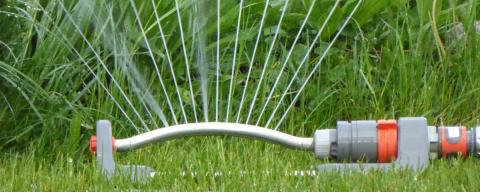Saving Water Makes Sense
New Hampshire is known as a state with lots of water. We have streams, rivers, lakes, ponds, wetlands, estuaries and the ocean. Why should we think about water conservation? Recent periods of extended drought have shown that our water supplies, though usually adequate, can vary dramatically with changes in precipitation patterns. These droughts have gotten many people thinking more about how to conserve water. Using less water not only helps avoid severe shortages later, it offers other benefits as well. For example:
Saving Water Saves Energy
Water is heavy − about 8 pounds per gallon − and it takes considerable energy to move it. If you have a private well, saving water reduces the amount of time your pump is running and cuts your electric bill. Even if you’re on a public water supply, conserving water reduces the amount of electricity your utility uses to pump water. These energy savings provide indirect benefits as well - less electricity use means less air pollution from fossil fuel generating plants, less waste from nuclear power plants and less need for hydro facilities. Because all these power generating sources impact water resources, conserving electricity also helps prevent water pollution.
Water Conservation Maintains Normal Levels
Water conservation maintains groundwater and stream flows at normal levels, keeping supplies available for other users. It also keeps the size of your well’s zone of contribution small. This is the area of land that is directly above the groundwater your well is drawing down. The smaller it is, the less you have to be concerned about pulling in pollutants from nearby high-risk land uses. Using less water also allows more treatment time for wastewater in your septic system, or, in an urban setting, reduces wastewater treatment volumes and costs. If you water your lawn or garden, water conservation can reduce the chance of leaching nitrates (from fertilizer) or chemicals into groundwater. Of course, during droughts, water conservation is insurance against your well going dry altogether.
Reduce Pollution from Runoff
Saving water can reduce pollution from runoff that occurs when excess water is used to irrigate gardensand landscapes. Applying water beyond what plant roots can take up can cause fertilizer components such as nitrate to wash into ground or surface waters, creating health and environmental risks.
Prevent Septic System Failure
Using less water can prevent septic system failure. Hydraulic overload is a common cause of the failure of septic system leach fields. Reducing water use and making sure toilets, sinks and appliances aren’t leaking are preventive measures. Water conserving fixtures and appliances also help to maintain septic systems in working order.
Reduce Saltwater Intrusion
In areas near the coast, water conservation reduces the risk of saltwater intrusion into groundwater wells. In places where salt and fresh water meet, the salt water commonly penetrates inland some distance beneath the land surface. Removing too much fresh water allows saltwater to intrude, displacing the freshwater that was there and rendering the well useless.
There are many opportunities to conserve water around the home. These conservation strategies fall into two categories: changes in equipment and appliances and changes in our behavior. Here are some examples:
In the home:
- Low flow faucets and showerheads reduce water use directly.
- Low flow toilets can make a big difference. Almost half the water used in a typical home ends up down the toilet! You can also reduce the volume of an existing tank by placing plastic bottles filled with water in it.
- Insulating hot water pipes saves water and energy (less is needed if it doesn’t lose heat on its way to the tap). While waiting for shower water to heat up, collect the cooler water in a 5-gallon pail to use for flushing toilets.
- Water-saving appliances are readily available and do the job with less water.
- Leaky faucets and appliances can lose significant amounts of water over time and are usually easy to repair.
In the garden:
- Using drought-tolerant species for landscaping will save water and time. Contact UNH Cooperative Extension’s Education Center’s toll free Info Line (1-877-398-4769) for a list of drought-resistant plants.
- Watering in calm, cool weather and before midday when evaporation loss is greatest will provide more water to plants and less to evaporation.
- Watering is best done thoroughly but infrequently.
- Drip irrigation or soaker hoses are more efficient than overhead sprinklers and recommended in areas such as vegetable gardens that are watered regularly.
- Mulches of all types are a classic way to conserve water in addition to their other benefits, such as suppressing weeds, helping prevent plant diseases and maintaining even soil temperatures.
- Roof runoff can be directed to garden areas or collected in barrels or other containers for later irrigation use.
- Weeds kept in check will reduce water loss; weeds compete for available water.
From many perspectives, water conservation is a winning strategy. Saving water helps you cut costs, keep groundwater and surface water supplies in balance and prevent air and water pollution. Take a fresh look at your home water supply. How many ways to save water can you identify?
Do you love learning about stuff like this?
SUBSCRIBE TO Granite State Gardening newsletter
Got questions? The UNH Extension Yard and Garden Infoline offers practical help finding answers for your yard and garden questions.
Call toll free at 1-877-398-4769, Monday to Friday, 9 a.m. to 2 p.m., or fill out webform.
